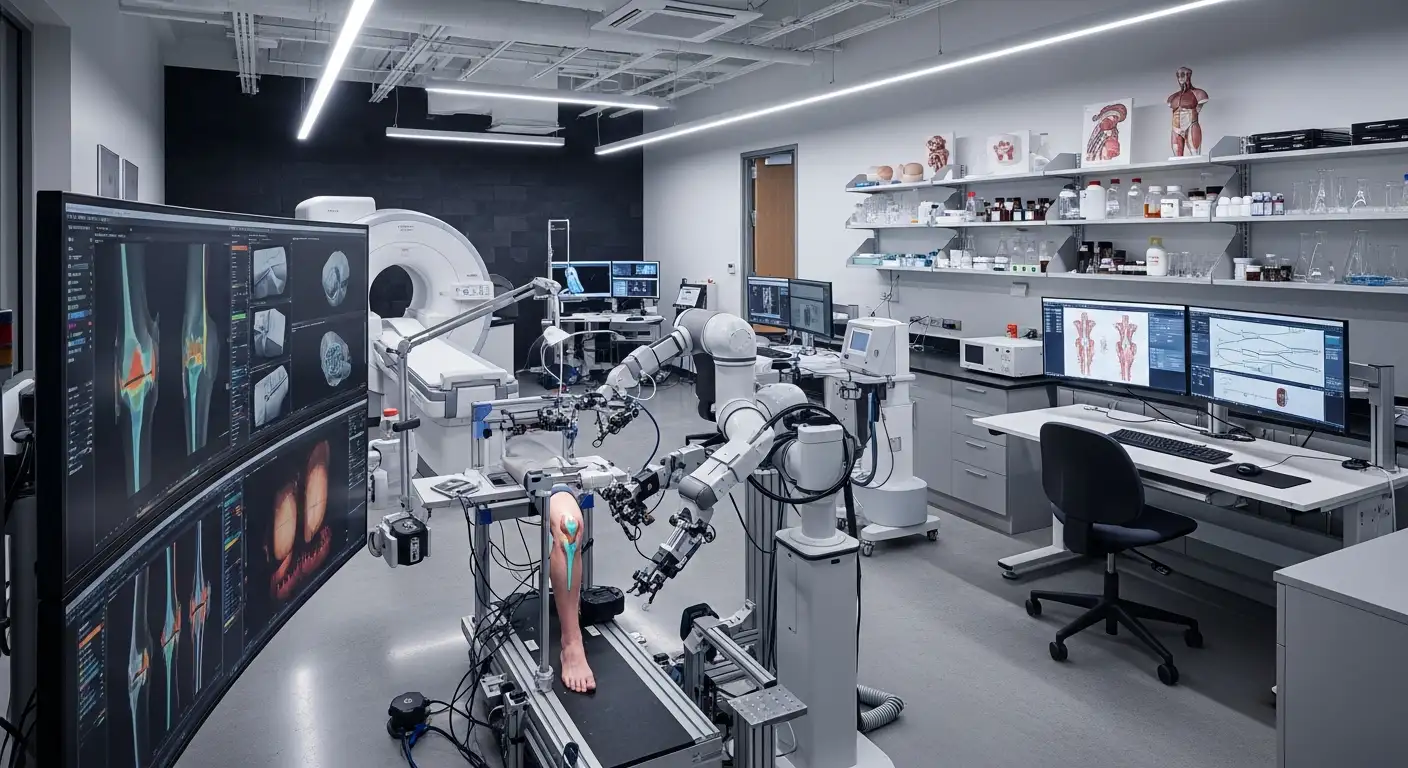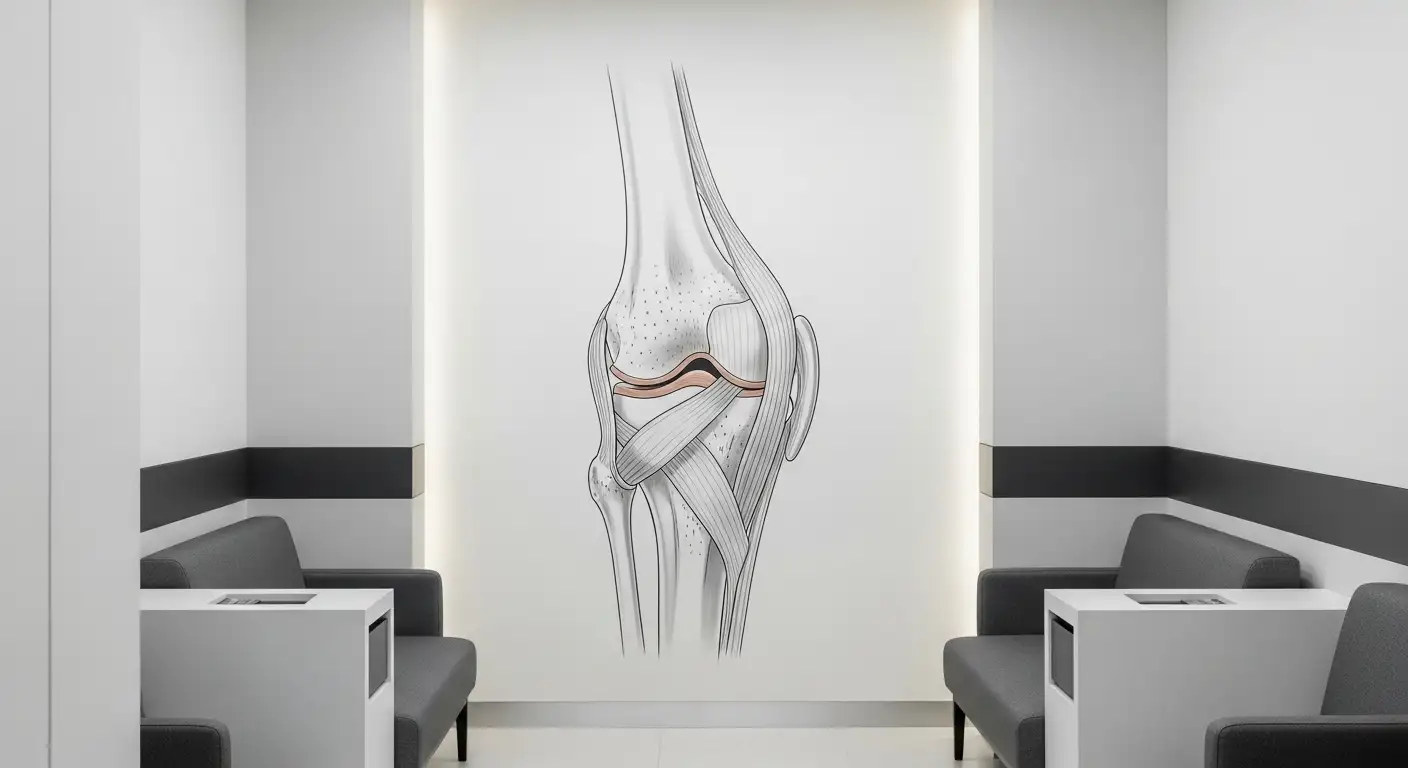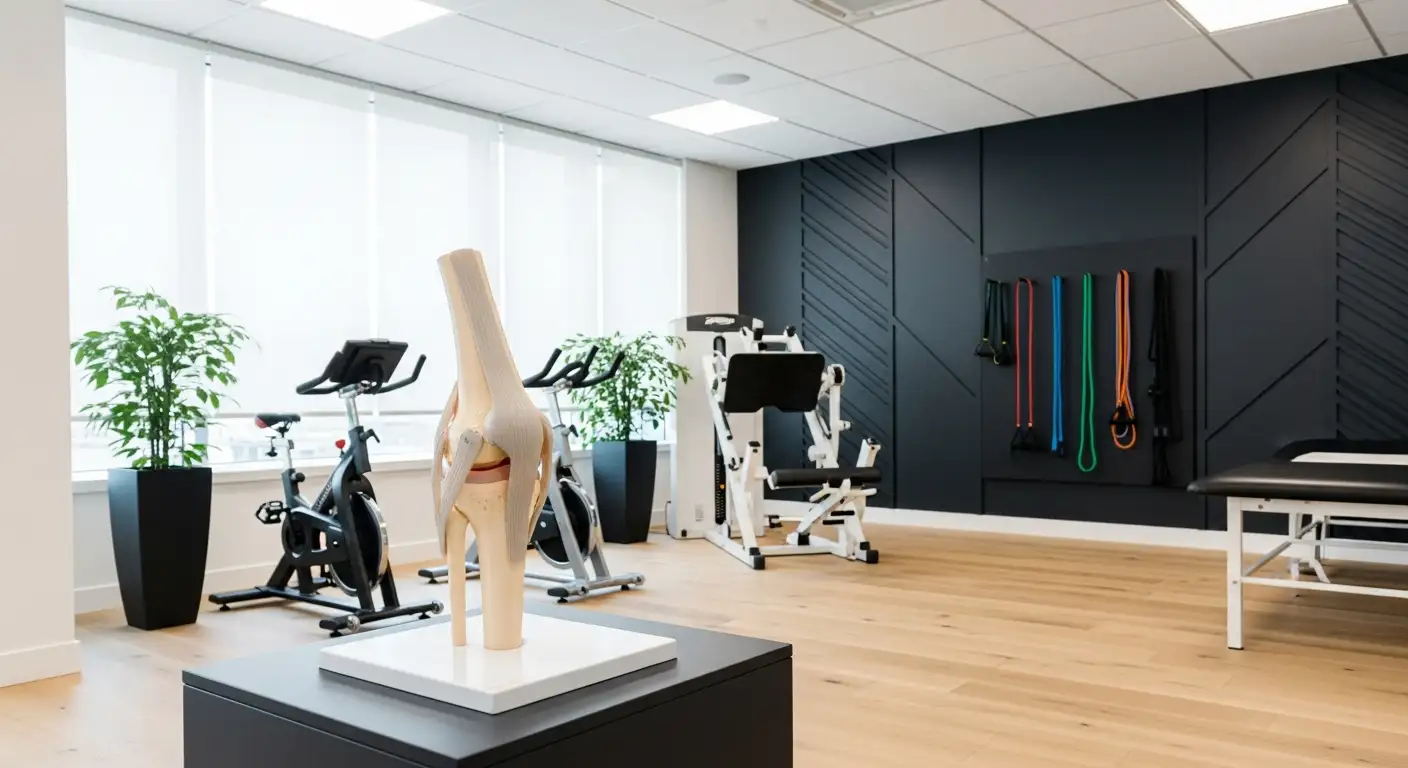Understanding Knee Pain at Night
Experiencing knee pain at night can be a particularly frustrating and debilitating issue. In order to understand the causes of knee pain at night, it's essential to consider the anatomy of the knee and the role sleep plays in pain.
The Anatomy of the Knee
The knee is a complex joint, and its health is crucial for mobility. The knee joint is made up of bones, cartilage, ligaments, and tendons, all of which can be affected by various conditions that may lead to knee pain. These conditions can develop due to injury, overuse, or age-related degeneration.
For example, arthritis, which is a common cause of knee pain, involves the breakdown of cartilage between bones, leading to joint stiffness, pain, and inflammation. Osteoarthritis commonly affects older adults, while rheumatoid arthritis can affect people of any age and is an autoimmune condition.

Meniscus tears, another common cause of knee pain, occur when the cartilage that cushions and stabilizes the knee joint is damaged due to sudden twisting or excessive pressure [1].
Other conditions such as tendinitis, an inflammation of the tendons, and bursitis, the inflammation of the bursae (small fluid-filled sacs that cushion the outside of the knee joint), can also lead to knee pain [1].
Role of Sleep in Knee Pain
Sleep plays a significant role in the experience and management of knee pain. Knee pain can be aggravated during sleep by the accumulation of fluid in the knee joint. Being in a reclined position for an extended period can increase pressure on the nerves, causing discomfort, numbness, and the feeling of pins and needles.
Furthermore, sleep disturbances due to knee pain can trigger a cycle of anxiety, depression, and reduced physical activity, all of which can exacerbate chronic pain conditions like osteoarthritis.
Understanding the anatomy of the knee and the connection between sleep and knee pain is the first step towards managing this condition. Addressing the underlying causes of knee pain through lifestyle changes, physical therapy, medications, and in some cases surgery, can help improve sleep quality and reduce nighttime knee discomfort.
Common Causes of Nighttime Knee Pain
Understanding the causes of knee pain at night is crucial in finding effective treatments. A variety of conditions can lead to this discomfort, including osteoarthritis, rheumatoid arthritis, bursitis, and tendinitis.
Osteoarthritis and Knee Pain
Osteoarthritis is a leading cause of knee pain. This condition results from the breakdown of cartilage between bones, leading to joint stiffness, pain, and inflammation. These symptoms often worsen during periods of inactivity, such as sleep. The loss of cushioning between the bones can also lead to the formation of bone spurs, which can cause additional pain at night.
Impact of Rheumatoid Arthritis
Rheumatoid arthritis (RA) is another common cause of nighttime knee pain. Unlike osteoarthritis, which is a degenerative disease, RA is an autoimmune condition. This means the body's immune system mistakenly attacks healthy tissue, leading to inflammation and pain. Knee pain, stiffness, and swelling are common symptoms of RA, and these symptoms may be worse in the morning or at night.
Role of Bursitis and Tendinitis
Bursitis and tendinitis can also contribute to knee pain at night. Bursitis refers to the inflammation of the bursae, small fluid-filled sacs that cushion the outside of the knee joint. This condition often results from repetitive activities or prolonged kneeling, causing knee pain that worsens at night.
On the other hand, tendinitis involves the inflammation of the tendons. Like bursitis, it can lead to knee pain and is often caused by repetitive activities, such as running or jumping, that put stress on the tendons around the knee joint.
In conclusion, numerous conditions can cause knee pain at night. Identifying the underlying cause is the first step in managing this pain effectively. If one suspects they have any of these conditions, it's essential to seek medical advice to receive accurate diagnosis and treatment.
Other Factors Leading to Knee Pain
While conditions like arthritis and bursitis are common causes of knee pain at night, there are several other physical factors that can lead to this discomfort. This section focuses on the influence of meniscus tears and the effect of overuse and injury on knee pain.
Influence of Meniscus Tears
Meniscus tears are a frequent cause of knee pain, especially during the night. The meniscus is a piece of cartilage acting as a cushion and stabilizer for the knee joint. Tears in the meniscus can occur due to sudden twisting movements or excessive pressure on the knee, leading to pain and discomfort [1].
A throbbing sensation experienced during the night may result from the body's attempt to heal the tear. This process leads to increased blood flow and nerve sensitivity in the injured area. However, the limited blood supply to the meniscus makes it difficult for the tear to heal effectively, resulting in increased pain and discomfort during sleep.
Moreover, the injury disrupts the normal functioning of the knee joint, leading to inflammation and discomfort, particularly when lying down.
The Effect of Overuse and Injury
Overuse and injury are other significant factors that can lead to knee pain at night. Activities that put excessive stress on the knee joint, such as running, squatting, or jumping, can lead to overuse injuries. These injuries can cause inflammation, swelling, and pain in the knee, which may become more pronounced at night.
Knee injuries, such as ligament tears or fractures, can also result in knee pain. These injuries often cause acute pain and discomfort, which can disrupt sleep. The pain may also become worse at night due to the body's healing processes, which can cause increased blood flow and inflammation in the injured area.
It's important to seek medical attention if you experience persistent knee pain, especially if the pain disrupts your sleep. Early diagnosis and treatment can help to prevent further damage and relieve pain. In addition to medical treatment, lifestyle changes, such as regular exercise and maintaining a healthy weight, can also help to manage knee pain and improve sleep quality.
The Connection between Diet and Knee Pain
The diet we follow plays an instrumental role in our overall health and well-being. It can significantly influence the occurrence and severity of various medical conditions, including knee pain at night. This section will delve into the impact of diet on knee pain, focusing on malnutrition and weight management.
Impact of Malnutrition on Chronic Pain
Malnutrition, characterized by unhealthy dietary behaviors and poor dietary intake, can substantially affect the onset, prognosis, and persistence of chronic pain, including knee pain at night. Up to 50% of older adults (over 65 years) in Australia, for example, are malnourished or at heightened risk of malnutrition. This condition is linked to an increased risk of sarcopenia (loss of muscle mass and strength) and falls, both of which can exacerbate knee pain.
Furthermore, individuals over 60 years experiencing chronic pain are nearly twice as likely to develop frailty compared to those without chronic pain. Frailty, in turn, can increase the risk of disability, falls, hospitalizations, and mortality [6].
Role of Weight Management in Pain Reduction
Weight management is another critical factor in managing knee pain, especially during the night. Research has shown that there is a higher prevalence of chronic pain among individuals with unhealthy weight, including those who are underweight, overweight, or obese, compared to those maintaining a healthy weight [6].
Weight loss can be a beneficial strategy in managing knee pain, as it lessens the daily stress exerted on knee joints and ligaments. Reducing weight can effectively lower the pressure on the knees, thus alleviating pain and improving mobility [5].
In conclusion, maintaining a balanced diet and healthy weight can significantly help in managing knee pain. It is essential to consult with a healthcare professional or a registered dietitian for personalized dietary and weight management advice, especially for individuals suffering from chronic knee pain at night.
Managing Knee Pain for Better Sleep
Addressing the causes of knee pain at night is essential for improving sleep quality and relieving discomfort. This involves a combination of treatment options and lifestyle changes.
Treatment Options for Knee Pain
Several treatments are available to manage nighttime knee pain, ranging from over-the-counter medications to physical therapy and, in some cases, surgery Healthline.
Over-the-counter painkillers like naproxen (Aleve) or ibuprofen (Advil) can help lessen knee pain at night due to their anti-inflammatory properties. These medications work by reducing inflammation, unlike acetaminophen, which only masks the pain Cleveland Clinic.
Physical therapy can also be a viable treatment option. It involves exercises designed to strengthen the muscles around the knee, enhancing stability and reducing pressure on the joint.
In severe cases where conservative treatments are not effective, surgical intervention might be considered. This could involve arthroscopic surgery, partial knee replacement, or total knee replacement, depending on the severity and location of the damage.
Lifestyle Changes for Pain Management
Besides medical treatments, there are several lifestyle changes that can greatly help manage knee pain at night and improve sleep quality.
Weight loss is a helpful strategy in managing knee pain as it reduces the everyday stress on knee joints and ligaments Cleveland Clinic. Regular exercise for at least 150 minutes per week is also recommended, as it strengthens muscles supporting the knee and promotes weight loss NCBI.
Adjusting sleeping positions can also help reduce knee pain at night and promote better sleep. For instance, sleeping on your side with a pillow between your knees or sleeping with a pillow under your knees can offer relief for individuals with arthritic knees Cleveland Clinic.
By combining these treatment options and lifestyle changes, one can manage nighttime knee pain more effectively, leading to better sleep and improved overall health.
The Vicious Cycle of Pain and Sleep Disturbance
Sleep plays a critical role in overall well-being, including the management of chronic pain conditions such as knee pain that worsens at night. Disruptions in sleep due to this discomfort can create a vicious cycle that exacerbates the pain and further disturbs sleep patterns.
The Impact of Inadequate Sleep
Sleep disturbances due to knee pain can trigger a cycle of anxiety, depression, and reduced physical activity, which in turn can exacerbate chronic pain conditions like osteoarthritis. Additionally, these disturbances can further worsen the pain by reducing the body's pain threshold, leading to a vicious cycle of pain and poor sleep.
Chronic pain, which affects approximately 20% of adults worldwide, is associated with high healthcare use and costs, functional impairment, and disability [6]. In older people (over 60 years), those with chronic pain are almost two times more likely to develop frailty compared to those without chronic pain. Frailty is associated with an increased risk of disability, falls, hospitalization, and mortality.
Breaking the Cycle of Pain and Poor Sleep
Breaking the cycle of pain and poor sleep involves addressing both the causes of knee pain at night and the factors that contribute to sleep disturbance. Knee pain at night can be caused by various factors, such as osteoarthritis, bursitis, tendonitis, or a tear in the meniscus. These conditions can cause discomfort and throbbing pain that worsens when lying down [3].
To break the cycle, individuals should seek appropriate treatment for the underlying knee condition causing the nocturnal pain. This could involve medical interventions, such as medications, physical therapy, or in some cases, surgery. In addition to medical treatments, lifestyle changes like maintaining a healthy weight, practicing good sleep hygiene, and engaging in regular physical activity can also help manage knee pain and improve sleep quality.
Furthermore, seeking help for mental health issues like anxiety and depression, which can be exacerbated by chronic pain and sleep disturbance, is also crucial in breaking this vicious cycle. Cognitive-behavioral therapy, mindfulness techniques, and other psychological interventions can help individuals cope with the psychological impact of chronic pain and sleep disturbances.
By addressing both the physical and psychological aspects of knee pain and sleep disturbance, individuals can break the vicious cycle of pain and poor sleep, leading to improved quality of life.
References
[1]: https://www.medicalnewstoday.com/articles/311308
[2]: https://www.healthline.com/health/osteoarthritis/sleep-better-knee-pain
[3]: https://www.verywellhealth.com/throbbing-knee-pain-at-night-5112675
[4]: https://www.hingehealth.com/resources/articles/knee-pain-at-night/
[5]: https://health.clevelandclinic.org/why-do-i-have-knee-pain-at-night




